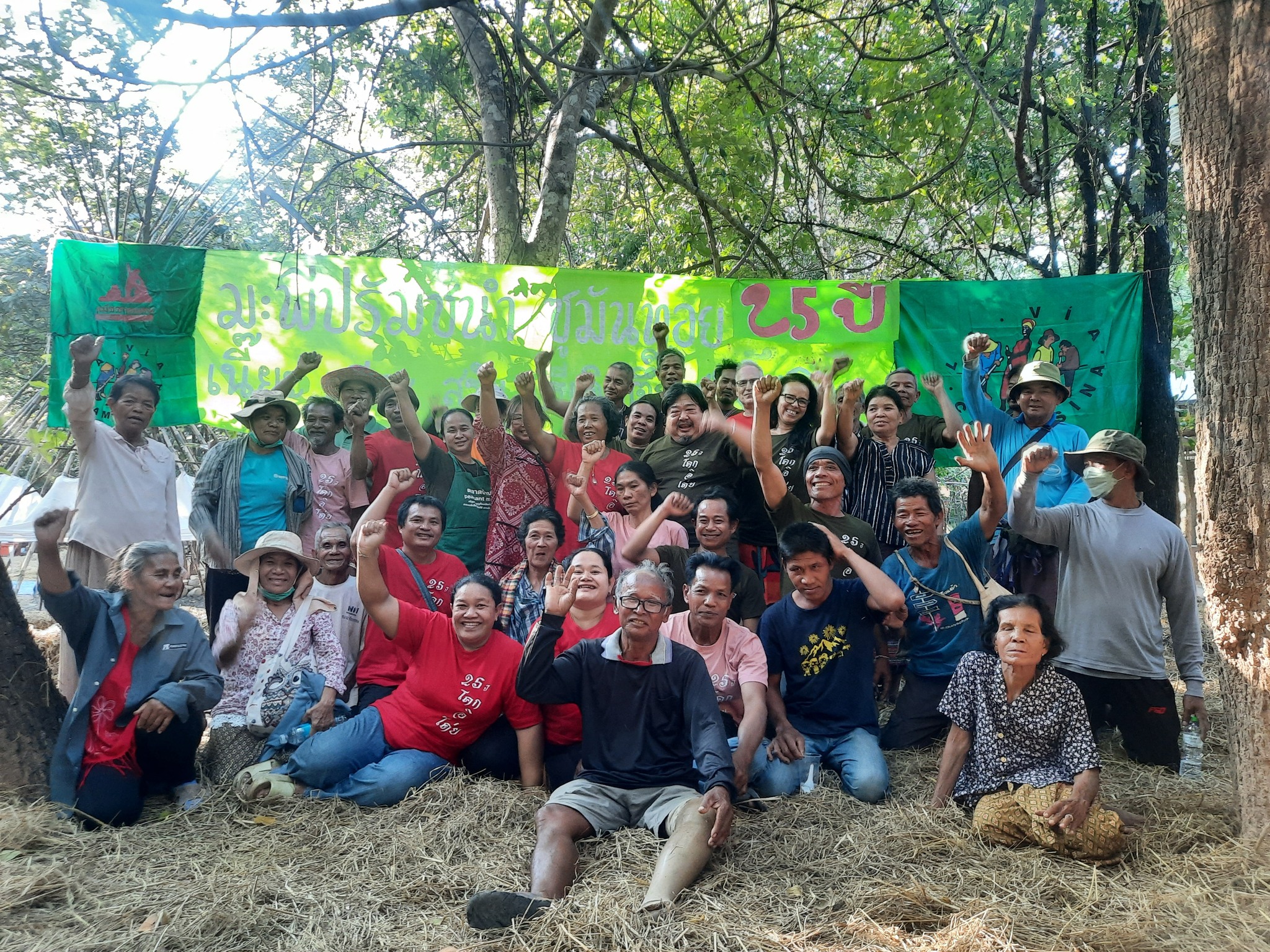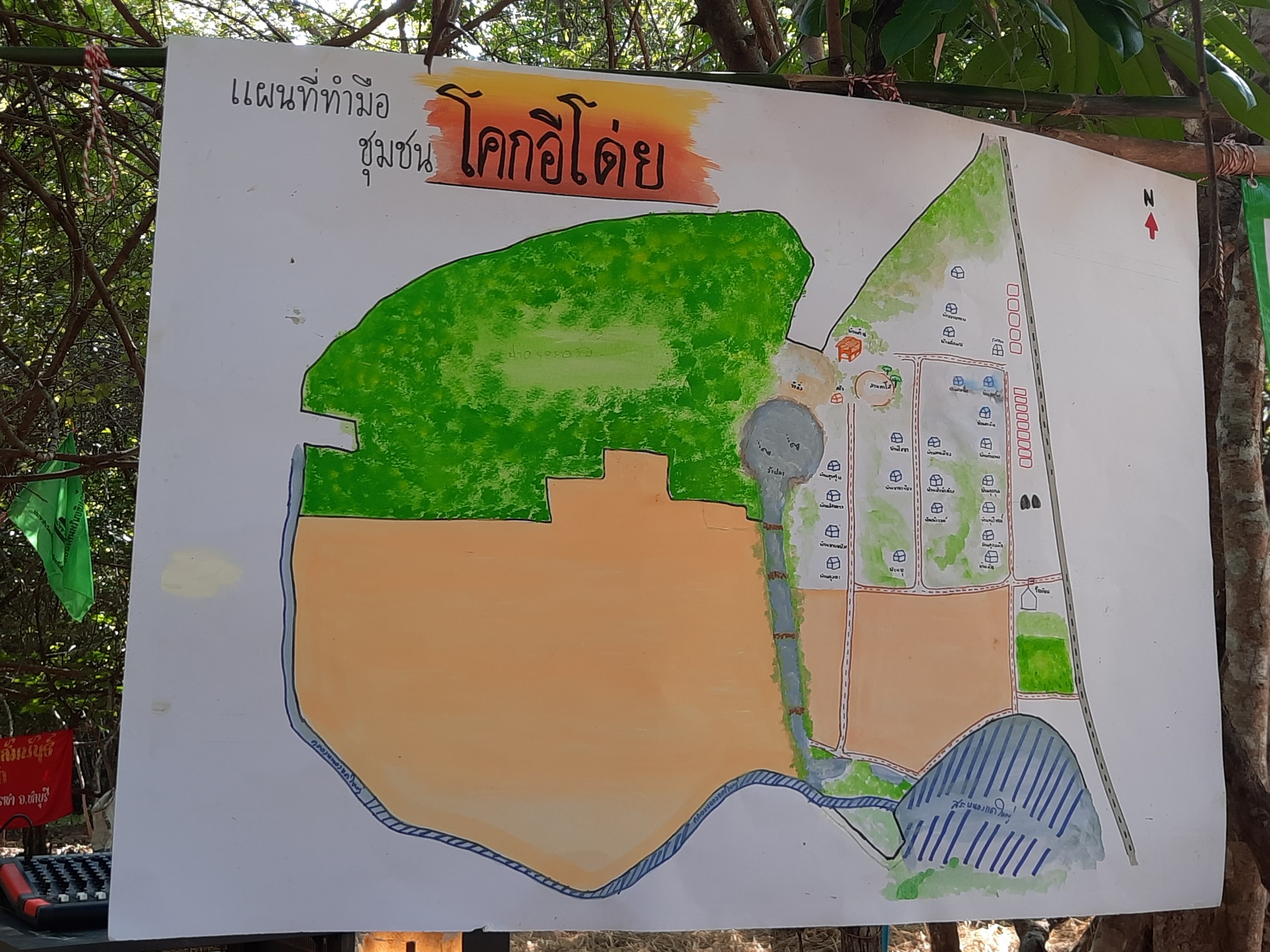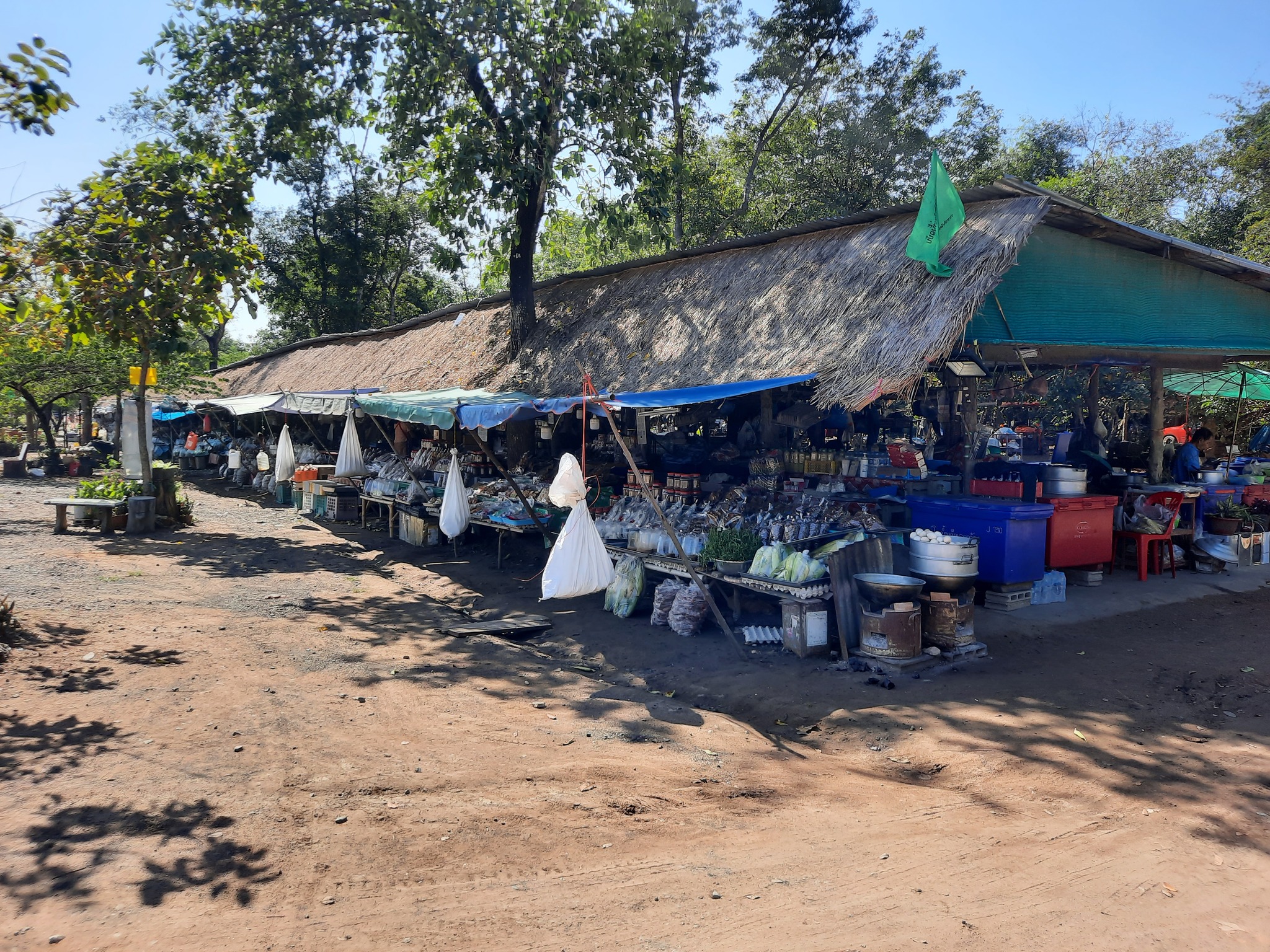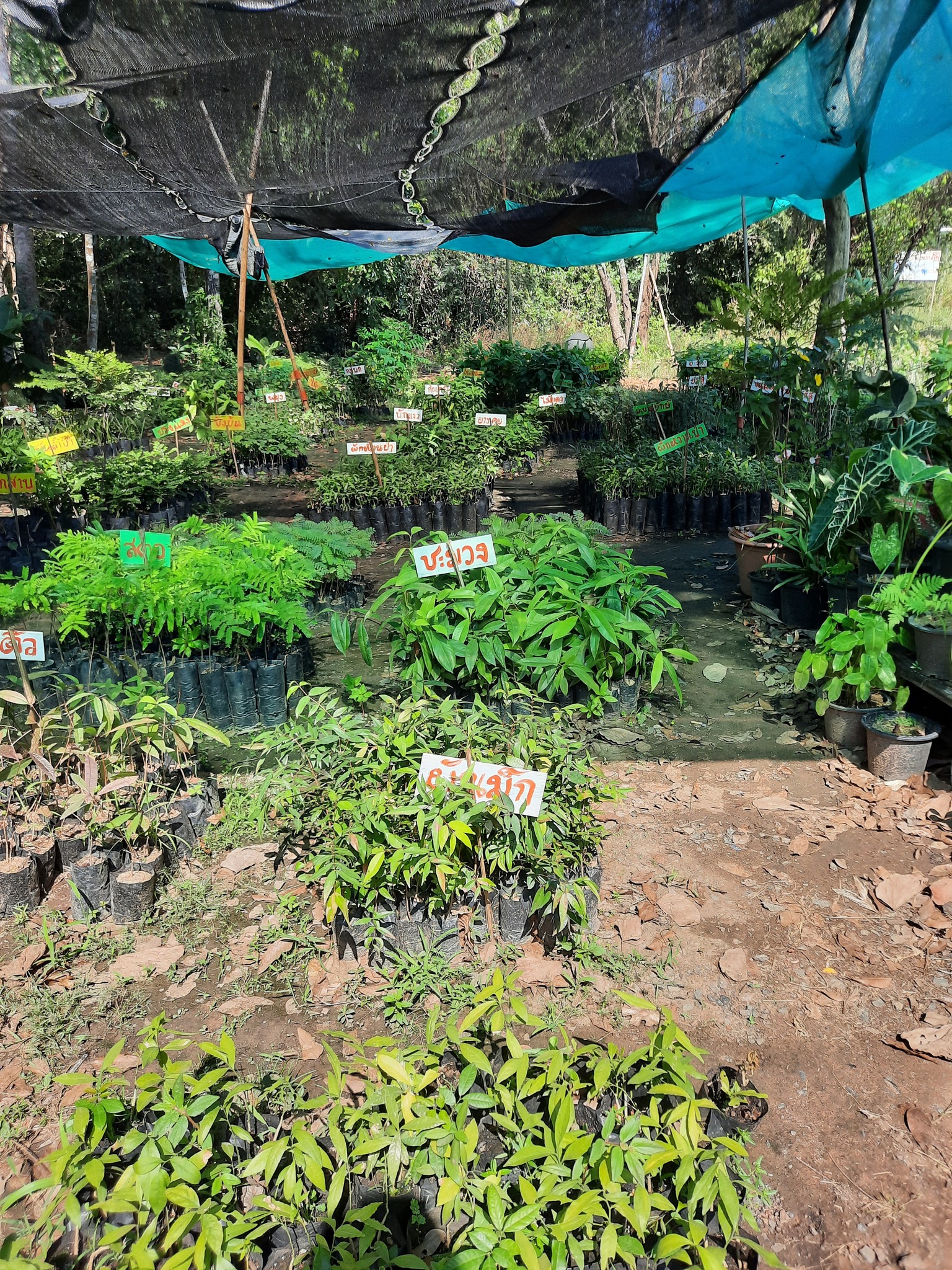Community-led Reforestation and Food Sovereignty in Thailand
Grow Ahead partnered with The Assembly of the Poor, a nationwide organization of grassroots community-based organizations and groups of people affected by Thai government’s policies and economic development projects, for the Community-led Reforestation in Food Sovereignty campaign. The project worked with 4,000 Farmers + Community Members to plant 65,000 trees and supporting plants. We recently caught up with the Kok Edoi Community in the Thapparat sub-district, Ta Phraya district, Sra Kaeo province, Thailand to talk about the project's progress and importance of their work.
Tell us about yourselves and the origins of Kok Edoi.
Kok Edoi Community recently celebrated its 25th anniversary of settlement on January 13, 2023. The villagers have struggled almost 30 years to get the rights to land. Their original agrarian lands were confiscated by the government, but after many years of struggles under the banner of The Assembly of the Poor (AOP), the government promised to return the land. But that land was used by a company for growing eucalyptus trees for the paper industry. As the government did not transfer ownership of the promised land, the villagers decided to occupy the land and established Kok Edoi Community. The community continues to fight for land ownership until now.

What is climate justice to you?
Because Kok Edoi Community is located on occupied land, it is not an official village. The villagers do not have access to electricity, a water supply, or other public utilities. People engage in small-scale agriculture and forest product collection for a living. The villagers do not use electricity or produce greenhouse gas, but industries do. Therefore, it is not fair to accuse people like Kok Edoi as the cause of the climate change crisis and then force them to accept fake solutions such as carbon credits.
Why are you promoting integrated farms, agroforestry farms, community forests, and family food forests?
Land insecurity and land rights violation are major problems for peasants. When villagers occupied the land and built Kok Edoi Community, the land was a degraded forest area. The confiscated eucalyptus plantation destroyed soil fertility, and the area now suffers from low rainfall, droughts, and forest fires. These hardships make agricultural production difficult. Additionally, the villagers faced constant intimidation and harassment from officials and capitalists. People started seeking outside jobs for survival. The question at that time was how to make people stay on the land that they occupied.
Villagers of Kok Edoi Community have forest product collection skills, such as the foraging of forest vegetables, mushrooms, etc. They started collecting forest products for eating and selling, but it is not easy because the community is located near the National Park and the officials there are not friendly. Therefore, the villagers decided to make family and community food forests.
Kok Edoi leadership proposed that the Assembly of the Poor should join La Via Campesina activities. Inspired by Zapatista’s Council of Good Government, Kok Edoi Community adopted a Community Council system, with rotating leadership and numerous working committees. Land management, land allocation, and zoning decisions are decided with full participation of the Committee Council.
Every Kok Edoi household is allocated a 1-rai plot for residence (0.4 acres), a 6-rai plot for plantation (2.36 acres), a streamside half-rai plot (0.2 acres) for production, and area for a family food forest. In addition, there are collective food forests, a collective plantation, community forests, fish and bullfrog sanctuaries, and 4 acres of land for a future Agroecology School. The Communal Area consists of a Meeting Hall, Discussion Circle, kitchen, and the community’s roadside market.
For individual production in their 6-rai plot, at the beginning, many Kok Edoi villagers planted monoculture cash-crops (mainly casava) for income. Nowadays, the number of people doing monoculture is shrinking because they've gradually shifted to agroecology, particularly agroforestry. By growing forest food plants in the formerly eucalyptus-filled family food forests, the soil becomes more fertile and yields more food. Even near their homes, almost all families grow agroecological kitchen gardens.


Shortly after our establishment, Kok Edoi Community built a roadside market to sell the forest products grown and collected in the community. The market turned out to be a good business, allowing the community to be economically self-reliant. Many consumers are city people. In speaking to and purchasing from us, they gain more understanding about the community’s way of production and attempt to take care of nature and native food culture.
After 25 years of hard work, Kok Edoi Community has changed from a drought-ridden area to a greener village with more native trees, increased forest food varieties, and richer biodiversity.
Kok Edoi is an autonomous community. As the land dispute is not yet settled, the community cannot access public services and public funds. But through economic self-management, the villagers formed the Saving Fund and the Market fund. The profit from the two funds is used for community development projects, like, deepening the swamp, making water pipe systems in the plantation areas, improving sanitation of the Roadside Market, community welfare, etc. The economic situation has improved, and many young people are able to earn a good living at home.
What do you think will be the biggest challenge the next generation of farmers faces? What do you think needs to be done to ensure farmers stay in agroforestry farming in the coming years?
Every year, Kok Edoi organizes Children's Day, which happens to be the same day as the Community’s Anniversary Day, and more than 100 children join the event. Although the children have to leave the community for education when they grow up, they still have a bond with their home village. Many youths return to live and work in Kok Edoi on the plantation and at the Market.
In 2022, a small group of young peasants in the Assembly of the Poor formed a group called "The AOP Forest Youth Collective." They started to organize activities to reconnect rural children with the ecosystem in their neighborhoods that sustains agroecological production. The day-camp “Nature’s Classroom” brings the children of Kok Edoi knowledge of their forests, native genetic resources, trees, animals, agroecology, and the story of their village. The activity was very successful. The peasant youth group in Kok Edoi is planning more activities in 2023, for example, growing native trees to preserve native genetic resources and improving family food forests.
The youth group in Kok Edoi Community is very committed to working with children and youth from peasant families. Even without official land ownership, Kok Edoi today can attain a good level of land security and provide a good livelihood for them to stay in rural areas and continue the unfinished struggles of their parents and grandparents.
However, the new generation of peasant families have more choices of livelihood in the rural areas. With their education, they can participate differently in rural economic activities. For example, in the 2022 Nature’s Classroom Camp, the children and youth learned to dye material with natural items in their community forests. Some participants have the idea of making the naturally-dyed products for souvenirs. Others thought of producing seedlings of forest trees for sale, while some talked about ecotourism.
What can people in the cities do to support the projects that you are involved in?
The way of life and production in Kok Edoi Community does not produce greenhouse gas, but industries and cities do. Greenhouse gas emissions are the cause of the climate change crisis. It is then peasants like Kok Edoi villagers who are affected by irregular climate patterns and unusual natural disasters like drought, flood, heat, etc. Therefore, industry and cities owe the peasant and rural communities a great debt. They must support us our agroecological efforts, particularly, agroforestry. They must support us to keep our forests, and they must help us to obtain land rights. They must stop industries that cause greenhouse gas emission and support our use of renewable clean energy and other things that do not cause troubles to the world.
